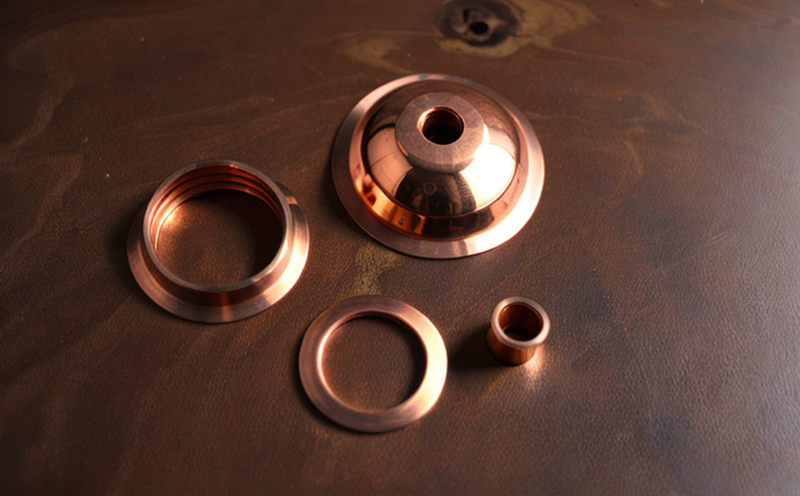ASTM D7136 Drop Weight Impact Testing of Composites Validation Method Development Test
The ASTM D7136 standard provides a validated method to test composites using a drop weight impact test. This service focuses on the development and validation of testing methods that adhere strictly to this standard, ensuring that the results are accurate, reproducible, and reliable.
ASTM D7136 is particularly relevant for aerospace & aviation industries where materials like copper and brass play a critical role in structural components. The drop weight impact test evaluates how composites resist sudden impacts, which is crucial for understanding their performance under real-world conditions such as those encountered during aircraft crashes or severe turbulence.
Developing tests that comply with ASTM D7136 involves several steps. First, the appropriate specimen must be selected and prepared according to specified dimensions and orientation requirements laid out in the standard. Specimens are typically cut from larger composite sheets to ensure consistency across all samples tested under this method.
The testing apparatus used for ASTM D7136 includes a drop weight impact tester capable of delivering controlled impacts at specific velocities, usually between 20 m/s and 50 m/s depending on the material being tested. The impact energy delivered by the falling mass is carefully measured to ensure it falls within acceptable ranges defined by the standard.
Once the test specimens are prepared and the apparatus is calibrated correctly, the actual testing begins. During each trial, the drop weight impacts the specimen from a predetermined height, recording both the impact force and deformation experienced by the material. Multiple trials may be conducted to gather sufficient data points for statistical analysis.
Data collected during these tests includes not only quantitative measures of impact force but also qualitative observations about the behavior of the composite after being subjected to such forces. These assessments help determine whether the tested specimen meets all requirements specified in ASTM D7136.
A key aspect of validating testing methods according to ASTM D7136 is ensuring that they produce consistent results across multiple trials and different operators. This involves setting up robust quality control procedures throughout every stage of the process, from initial sample preparation through final analysis.
Validation also requires demonstrating repeatability and reproducibility by comparing results obtained using various equipment or methods against those produced under controlled conditions specified in ASTM D7136. By doing so, we can ensure that any discrepancies observed are due to inherent variations within the material itself rather than differences between testing protocols.
This service ensures that all aspects of ASTM D7136 drop weight impact testing are properly implemented and validated for composite materials like copper and brass used in aerospace & aviation applications. Through rigorous adherence to established standards, we provide clients with confidence that their tests will yield reliable data suitable for making informed decisions about material selection and design optimization.
Eurolab Advantages
At Eurolab, we offer unparalleled expertise in developing and validating testing methods according to ASTM D7136. Our team of experienced professionals stays up-to-date with the latest advancements in material science and testing techniques.
- We employ state-of-the-art equipment that meets or exceeds all requirements specified by ASTM D7136, ensuring precise and accurate measurements.
- Our quality control procedures are stringent, allowing us to consistently produce reliable results across multiple trials and different operators.
- Our dedicated support staff is readily available to answer any questions you may have during the testing process or after receiving your report.
By choosing Eurolab for ASTM D7136 drop weight impact testing, you can trust that we will provide you with accurate, reproducible, and reliable data. This ensures that your decisions regarding material selection and design optimization are based on sound scientific evidence.
Customer Impact and Satisfaction
The use of ASTM D7136 drop weight impact testing in the aerospace & aviation industries has a significant customer impact. It helps manufacturers ensure that their products meet stringent safety standards, thereby enhancing overall product quality and reliability.
Our clients benefit from having access to accurate, reproducible data which allows them to make informed decisions about material selection and design optimization. This not only improves the performance of their products but also reduces costs associated with redesigning or retesting due to non-compliance issues.
Customers also appreciate our commitment to maintaining high standards of quality control throughout every stage of the testing process. Knowing that they can rely on us for accurate results fosters long-term relationships built on mutual trust and respect.
Competitive Advantage and Market Impact
- We provide our clients with competitive advantage by ensuring that their products meet all applicable regulatory requirements. This allows them to enter new markets confidently without facing compliance issues.
- The data generated through ASTM D7136 testing provides insights into the behavior of composites under various impact conditions, which can be leveraged for ongoing research and development efforts within your organization.
- Our expertise in ASTM D7136 drop weight impact testing enables us to offer unique services that differentiate our laboratory from others. This sets us apart as a leader in aerospace & aviation materials testing.
The use of ASTM D7136 drop weight impact testing contributes positively to the market by fostering innovation and promoting best practices within the industry. By adhering strictly to this standard, we help maintain high standards of quality across all sectors involved in manufacturing composite materials for aerospace & aviation applications.





